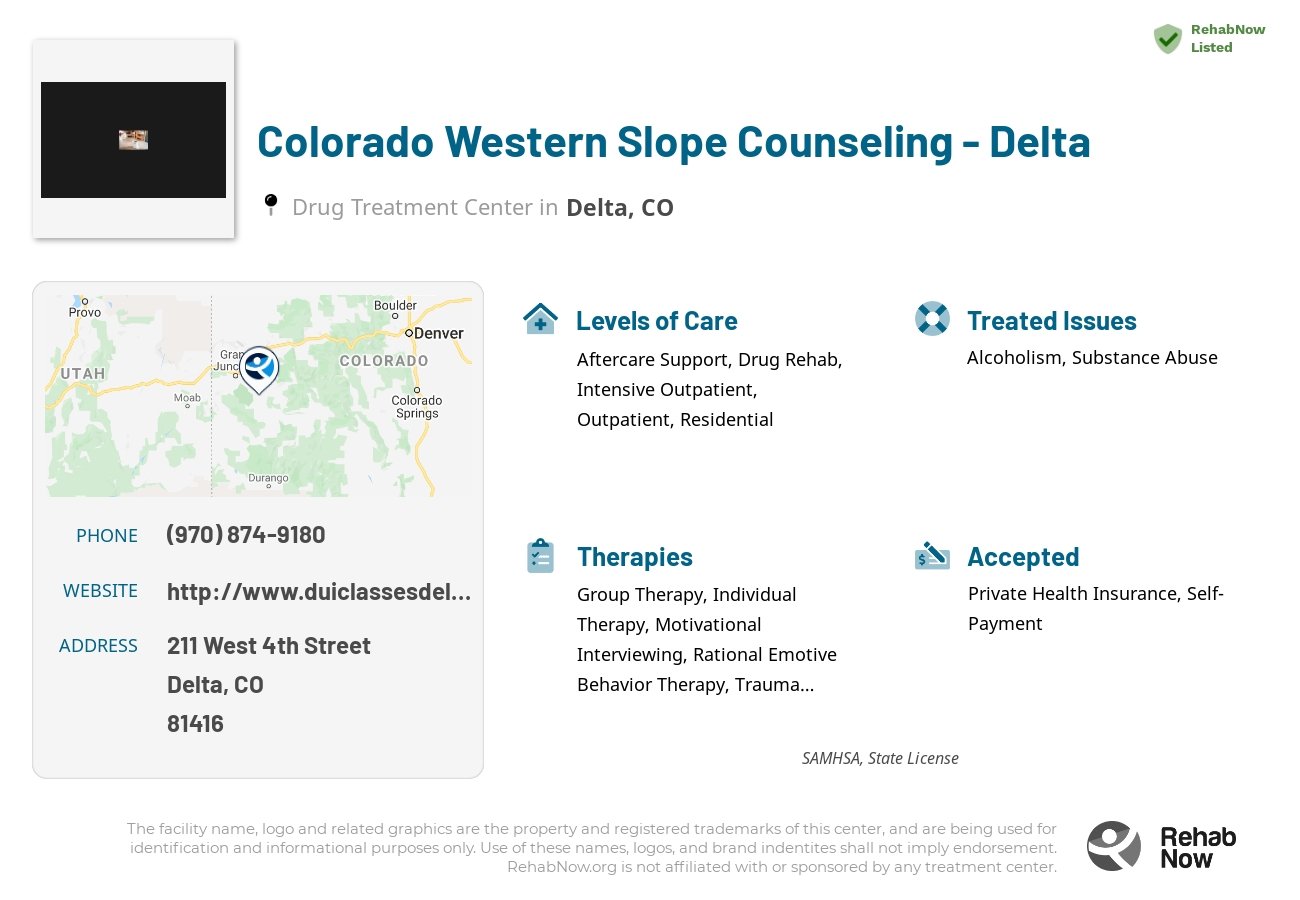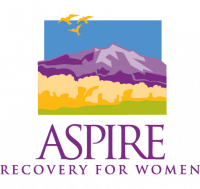Colorado Western Slope Counseling - Delta
Drug Rehab Center in Delta, Colorado
Colorado Western Slope Counseling - Delta is a substance abuse and addiction treatment facility that provides personalized, evidence-based care utilizing an outpatient model and emphasizes a team approach to addressing the needs of individuals.
About This Colorado Facility
Colorado Western Slope Counseling - Delta in Delta, Colorado is a substance abuse and addiction treatment facility that provides personalized, evidence-based care for individuals suffering from addiction. The center utilizes an outpatient model, in which individuals can receive therapeutic and supportive services within their community rather than a residential or inpatient setting. Colorado Western Slope Counseling - Delta emphasizes a team approach to addressing the needs of each individual and connecting them to the necessary resources for sobriety.
At Colorado Western Slope Counseling - Delta, individuals can receive individual and group counseling, psychotherapy, family therapy, and medication-assisted treatment (MAT). Group therapy sessions help individuals with addiction establish healthy relationships with peers, build trust, and gain insight. Specific treatments are tailored to each individual’s needs, whether they are struggling with alcohol addiction, opioid addiction, or prescription drugs, among many other substances of abuse. Colorado Western Slope Counseling - Delta also provides screenings, assessments, and relapse prevention services.
Colorado Western Slope Counseling - Delta is accredited by The Joint Commission and holds a license with the Colorado Department of Human Services. The center has also been recognized as an outstanding treatment provider by the Colorado Department of Public Health and Environment. Colorado Western Slope Counseling - Delta provides an array of resources to the community, such as support groups and educational materials. In addition, the facility offers holistic services, such as yoga and Tai Chi, which help individuals commit to recovery and build healthier lives.
Genders
Ages
Modality
Additional
Accreditations
State License
SAMHSA
Conditions and Issues Treated
People who abuse drugs are likely to suffer from an addiction, which can cause serious health problems. When it comes to helping drug abusers get sober, there are many options to choose from. It is essential to state that there is no “”correct”” way of doing things. People are different, and they need different types of help to get over their addiction.
Levels of Care Offered at Colorado Western Slope Counseling - Delta
This center offers a variety of custom treatment tailored to individual recovery. Currently available are Aftercare Support, Drug Rehab, Intensive Outpatient, Outpatient, Residential, with additional therapies available as listed below.
Outpatient addiction treatment is beneficial for people who are able to function well in their day-to-day lives. It is recommended for people who are not yet ready to end their relationships with friends or family members who might be encouraging drug and alcohol use.
Intensive outpatient treatment is beneficial for:
- People who are able to attend treatment more than 3 times per week.
- People who do not meet the criteria for inpatient treatment.
- People who are able to contribute to their own recovery outside of the treatment center.
- People who are motivated towards recovery.
- People who are able to overcome addiction on their own without the need for higher levels of care.
Outpatient treatment programs provide drug and alcohol addiction treatment through individual sessions with a counselor, group therapy, 12-step meetings, and other activities to help individuals gain sober living skills. Most programs are designed for those individuals who have completed a medically supervised detoxification program and provide opportunities for clients to begin the process of early recovery.
Outpatient programs also offer a level of medical support as needed and psychological backing through therapy. Clients are encouraged to live at home, though there may be some flexibility regarding this requirement based on the circumstances and needs of each patient.
Outpatient treatment is perhaps the most common type of dual diagnosis program available. It does not pose a significant financial burden on patients. However, it is essential to note that outpatient treatment does not provide the support and supervision given in residential programs. Some addicts may need this level of support to maintain their sobriety.
Residential treatment programs are those that offer housing and meals in addition to substance abuse treatment. Rehab facilities that offer residential treatment allow patients to focus solely on recovery, in an environment totally separate from their lives. Some rehab centers specialize in short-term residential treatment (a few days to a week or two), while others solely provide treatment on a long-term basis (several weeks to months). Some offer both, and tailor treatment to the patient’s individual requirements.
People who have completed a rehab program often need continued support from the addiction treatment team in order to remain abstinent from drugs and alcohol. Aftercare can be beneficial for personal, social, and emotional growth.
Common aftercare options include:
- Individual Therapy – this type of addiction counseling is available on a one-on-one basis. This can be beneficial for people with a high degree of emotional turmoil and a strong desire to overcome addiction.
- Group Therapy – this type of addiction counseling is available in a group setting. This type of treatment can be beneficial for people who are unable to attend regular therapy appointments due to other responsibilities.
- Family Therapy – this type of addiction counseling is available to the family members of addicts. This can be beneficial for people who are unable to fully comprehend what their loved ones are experiencing due to addiction.
Therapies & Programs
Therapy sessions focused on the individual addict can provide much-needed guidance as they work toward overcoming their addiction. These types of sessions typically involve guidance from a therapist, who will help addicts identify and process their feelings and cravings.
During these sessions, addicts may develop plans for coping with the triggers that typically lead to relapse and learn how to avoid those triggers during their recovery process.
Different types of addiction treatment services are available. Within this article, group therapy is of interest due to its high success rate compared to individual therapy. Group therapy settings are beneficial because they allow recovering addicts to build a strong support network.
Benefits of group therapy are:
- Reduces feelings of isolation
- Immediate access to social support in the form of fellow addicts in recovery
- Lowers risk of relapse
- Increases rate of sobriety
- Builds coping skills that can be applied to everyday life
Trauma Therapy is a form of therapy that involves working with a patient to help them process and understand the past trauma(s) in their life. The idea behind it is that while some people can experience traumatic events and not have lasting psychiatric symptoms, many others will. In these cases, memories of the event get hidden from consciousness but continue to influence how the person processes and copes with things in their life. They may avoid situations that resemble what happened or become suddenly angry or irritated to a situation that reminds them of a past event.
With the help of a therapist, people can go back over memories and experiences. This helps them understand why they are having problems coping with certain situations and how they can change how they think and react to things. This therapy is typically done using techniques such as visualization, discussion, and writing down thoughts and feelings.
Trauma therapists will work with clients to help them understand their past and present relationships. Many times, patients may believe that something is inherently wrong with them or that they are unworthy of love. A therapist aims to correct these negative feelings and behaviors by helping the person realize that their actions do not reflect who they truly are.
One of the main goals of trauma therapy is to help clients express their emotions and talk about what they are feeling. This benefits both to increase awareness of how certain events have impacted them in the past and enables patients to realize that they can make changes in their lives.
Cognitive Behavioral Therapy (CBT) is used by drug treatment centers to help addicts comprehend the causes of their substance abuse and the consequences that follow. Through CBT, clients learn to recognize and avoid high-risk situations and cope with challenging situations when they arise.
CBT treatment often includes a combination of individual therapy, group therapy, lectures, and other activities. The treatment’s goal is to help addicts gain self-control and maintain abstinence from drugs and alcohol over the long term so that an addict can get sober and lead a more productive life.
CBT is particularly effective in helping people overcome their drug problems, especially people whose drug abuse is motivated by self-defeating beliefs and emotions.
REBT stands for rational emotional behavior therapy. This type of cognitive-behavioral therapy, or CBT, combines images with thoughts and behaviors to provide deep self-help education in the process of recovery from addiction.
It’s important because it allows one recovering addict to work through their issues on their knowledge they have support if needed.
Rational Emotive Behavioral Therapy (REBT) is based on the idea people operate under many irrational but habitual patterns of thought which fuel harmful practices and feelings. As one learns to identify these destructive patterns, one can replace them with healthier thoughts and behaviors.
Payment Options Accepted
For specific insurance or payment methods please contact us.
Is your insurance accepted?
Ask an expert, call (888) 674-0062
Colorado Western Slope Counseling Associated Centers
Discover treatment facilities under the same provider.
- Colorado Western Slope Counseling - Paonia in Paonia, CO
- Colorado Western Slope Counseling - Delta in Delta, CO
- Colorado Western Slope Counseling - Paonia in Paonia, CO
Learn More About Colorado Western Slope Counseling Centers
Additional Details
Specifics, location, and helpful extra information.
Delta, Colorado 81416 Phone Number(970) 874-9180 Meta DetailsUpdated November 25, 2023
Staff Verified
Patient Reviews
There are no reviews yet. Be the first one to write one.
Delta, Colorado Addiction Information
The Centennial State has slipped to a ranking of 12th in the country for drug abuse. Each year around 24% of the state's population uses illegal drugs while nearly 5% of its population abuses alcohol. Substance-related deaths in Colorado were responsible for 15.12% between 2008 and 2017. Fortunately, Colorado drug and alcohol addiction treatment are available to help a person overcome addiction.
Drug addiction in Delta, Colorado, is a significant issue. According to recent statistics, there are around 9,000 people who abuse drugs in the area. This can lead to some problems, including health issues, criminal activity, and lost productivity. More than 70% of all drug overdose deaths in Delta are caused by heroin and other opiates. Sober living homes provide a supportive environment for individuals transitioning from addiction to sober living.
Treatment in Nearby Cities
- Akron, CO (277.4 mi.)
- Berthoud, CO (192.9 mi.)
- Pueblo, CO (190.5 mi.)
- La Junta, CO (251.1 mi.)
- Norwood, CO (43.9 mi.)
Centers near Colorado Western Slope Counseling - Delta
The facility name, logo and brand are the property and registered trademarks of Colorado Western Slope Counseling - Delta, and are being used for identification and informational purposes only. Use of these names, logos and brands shall not imply endorsement. RehabNow.org is not affiliated with or sponsored by Colorado Western Slope Counseling - Delta.








